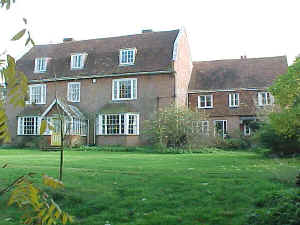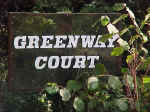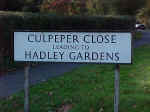Greenway Court
Hollingbourne, Kent
|

Photo by Warren Culpepper, October 1999
 |
Real Estate Listing Description
Jackson-Stops & Staff
September 2000
A Listed Grade II 18th century manor
house with adjoining cottage, in need of refurbishment, and
traditional garden with orchard. Substantial period brick barn
suitable for conversion into three houses, subject to planning
consent.
Main house: Hall drawing room, dining
room, sitting room, study, 8 bedrooms, 2 bathrooms, kitchen/breakfast
room, rear hall, workshop and cellar.
Adjoining cottage: Hall, reception
room, 4 bedrooms and bathroom.
Garden store, garden, orchard and
woodland, barn of approximately 526 sq.m.
In all about 3 acres.
|
Greenway Court History
Greenway Court, from which the sixth
Lord Fairfax derived the name of his wilderness lodge in Virginia,
still stands, close at the foot of the North Downs, on the boundary
line of Harrietsham and Hollingbourne.
Some of the old masonry dates
from the fourteenth century, but the house has been several times
rebuilt. Hasted says (ii, 466) that it "was formerly esteemed a
manor, the mansion of which was a seat of good account."
According to the owner in September 2000, the house, as it is today,
was built in 1786 on the old foundations. The previous house burnt
down in 1782.
Originally held by a family called Greenway, the estate came into the
possession of the Crown and was settled by Henry VIII upon the Dean
and Chapter of Canterbury. It was subsequently held by the St. legers,
and was purchased in 1572 by
Francis Culpeper11 (the second son of direct ancestors of
the modern-day Culpeppers: William Culpeper10 of Wigsell and
his wife, Cecily Barrett). Upon the death of Francis in 1591, Greenway Court passed
to his nephew, Alexander Culpeper12. It continued to be held by the
Culpepers until in 1719 it passed from Catherine Culpeper to her son
Thomas, the Sixth Lord Fairfax. In 1758, Robert, seventh
Lord Fairfax, alienated the leasehold to the banker, Sir Francis
Child.
Although the manor of Alnorthing was usually held with Greenway
Court, the latter was in itself never more than a dwelling house and
curtilage. Sir Alexander Culpeper12 describes it (Greenway
Court) in his will (1645) as "11 acres and no more," As
appears from the text, the house, though modest according to modern
standards, or when compared with Leeds Castle, was occupied in turn by
every branch of the Wigsell Culpepers, during an hundred and eighty
years, and was always held by that family in high esteem and affection
as a comfortable refuge from a cold world, where a tradition of old
hospitality and a simple family life might be maintained in dignity.
(Harrison, Fairfax, The
Proprietors of the Northern Neck, 1926.)
The owner as of September 2000 had lived in the home
for 49 years and had recently put it on the market.
Greenway Court
Location: 1
mile E of Hollingbourne on Greenway Court Road.
National Grid Coordinates:
TQ 852 541
Culpeper Ownership Summary
 |
Before 1572: Sir Warham St. Leger |
 |
1572-1591: Francis Culpeper11 |
 |
1591-1661: Sir Alexander Culpeper12
(Son of Francis11) |
 |
1661-1689: Thomas, Lord Culpeper14,
Second Baron of Thoresway (grandson of Thomas12,
brother of Alexander12) |
 |
1689-1719: Catherine Culpeper15,
(daughter of Thomas14) who married Thomas, Fifth Lord
Fairfax of Cameron |
 |
1719+: Thomas, Sixth Lord Fairfax
of Cameron (son of Catherine Culpeper) |
1831
Topographical Dictionary:
Hollingbourn, a parish in the hundred of Eyhorne, lathe of
Aylesford, county of Kent, 6 miles E from Maidstone, containing
1000 inhabitants... The church,
dedicated to All Saints, is a handsome edifice, attached to
which is a chapel with a marble floor, containing a superb
monument to the memory of Lady Culpeper. Village
of Hollingbourne
Location: 14 miles NE of
Goudhurst.
National Grid Coordinates:
TQ 843 551
Culpeper Close

Above: A street sign in Hollingbourne, at the
entrance of a modern subdivision. Unrelated to Greenway Court or
other known Culpeper properties. |
Last Revised:
02 Jan 2015
|
|